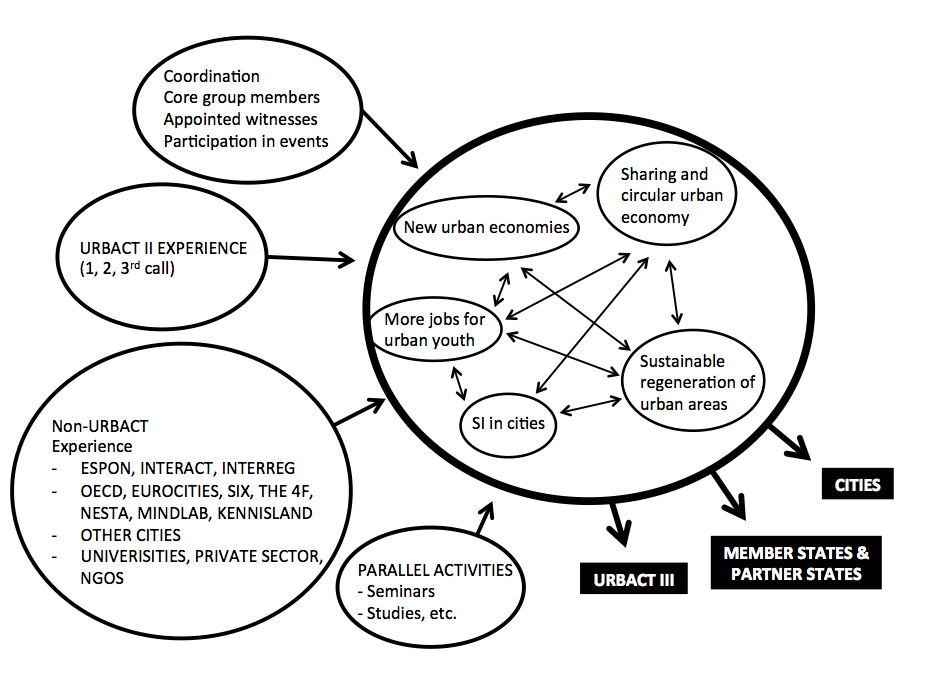URBACT Capitalisation
Capitalisation of URBACT
URBACTs projects from the first and second calls have produced a variety of outputs such as case studies, recommendations and tool boxes. In addition, a process of capitalisation was launched in order to reflect on the lessons learnt and ensure that other cities can benefit from these experiences and adapt to their own context the solutions to urban challenges developed within the programme.
In particular, the capitalisation process aims to consolidate and disseminate practical knowledge on sustainable urban policies while creating a new knowledge on the basis of the URBACT experiences produced within the projects but also on the basis of existing experience and knowledge coming from similar or complementary European projects/ programmes outside the URBACT programme. As a mean to foster mainstreaming of best practices and policy recommendations, the dissemination of this new knowledge follows each phase of Capitalisation. The following tools and methods have been developed in order to support and facilitate the Capitalisation process:
- Thematic Pole Managers;
- Workstreams;
- Thematic experts;
- Studies; and,
- Capacity-building for Local Support Groups (ULSGs).
Capitalisation Process 2012-2013
A first capitalisation process of URBACT took place in 2012-2013, with knowledge generated within the URBACT projects shared, discussed and documented around six different workstreams:
-
Shrinking Cities: Challenges and Opportunities
-
More Jobs: Better Cities
-
Supporting Young People Through Social Innovation
-
Against Divided Cities in Europe
-
Motivating Mobility Mindsets
-
Building Energy Efficiency in European Cities
The methodology of the first capitalisation process combined
- A series of meetings and exchanges between URBACT thematic experts and URBACT city partners as well as project partners of other interregional programmes (ESPON, INTERACT, INTERREG IVC), academics, international and European organisations (OECD, Energy Cities, EUROCITIES, CECODHAS, CIVITAS) ;
- The appointment of a coordinator for each workstream, responsible to set up a core group and coordinate activities, co-producing and delivering outputq;
- The involvement of witnesses, invited to hearings to share their experience and give advice on the work produced by the group;
- The transversality of parallel work between the 6 different workstreams, notably through meetings with the URBACT Secretariat; and,
- Participation in various events such as the URBACT annual conference and the Open Days
The results of the first Capitalisation process have been processed in the annual magazine “URBACT Tribune” and in the series of URBACT thematic reports “Cities of Tomorrow: Action Today”.
Capitalisation process 2014-2015
Based on the experience of the First capitalisation process, a second wave is now initiated. This process aim to achieve the following main objectives:
- To ensure proper capitalisation and dissemination of the knowledge, evidence and results
- To answer to the requests expressed by Member and Partner States
- To bridge the current thematic coverage of the programme with the thematic priorities that will drive the implementation of URBACT III.
Also, it was particularly stressed that the outcomes of this process will benefit the 15 new thematic networks under 3rd call.
The fives workstreams defined for this work have been defined as :
- New urban economies
- More jobs for urban youth
- Social innovation in cities
- Sustainable regeneration of urban areas
- Sharing and circular urban economy
The methodology used shall be similar to that of the first capitalisation process, together with the participation in several external events such as Open Days workshops in October 2014 and other dissemination events to which the 5 workstreams will be invited to contribute.
Overall, the process of this capitalisation process is summarised in the figure below.
